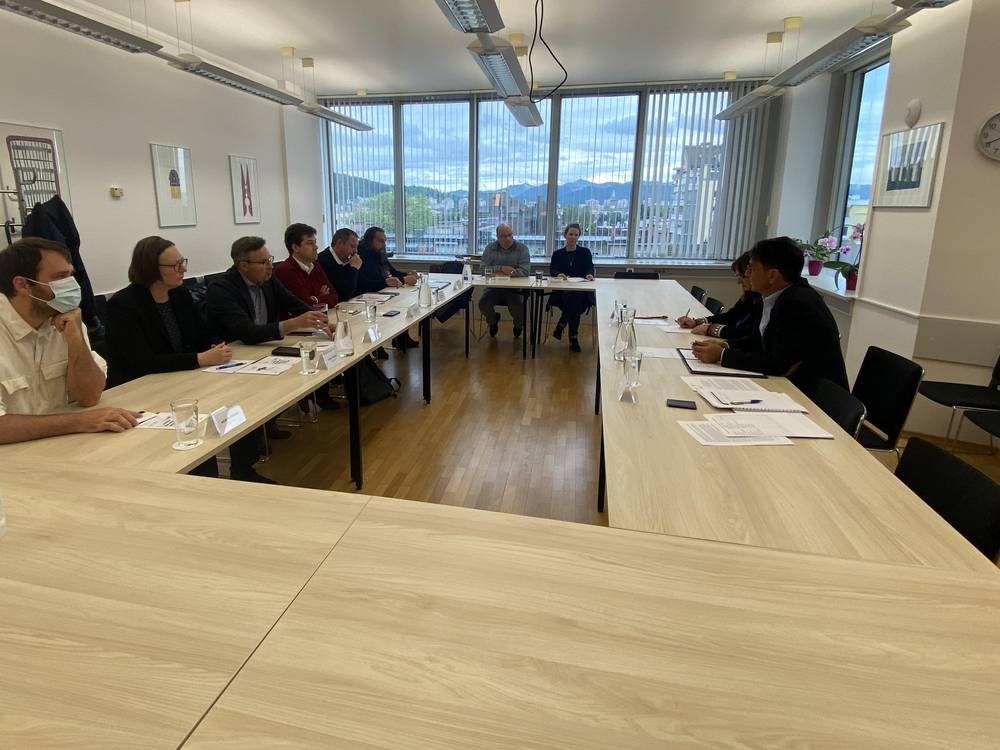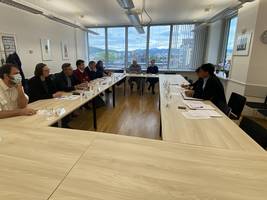On 16 May 2023, on the eve of World Telecommunication and Information Society Day, Human Rights Ombudsman Peter Svetina invited representatives of civil society dealing with this field for a meeting.
Marko Puschner from the Faculty of Social Sciences of the University of Ljubljana, Matija Šuklje, Mateja Strašek, and Simon Delakorda from the National Network of Non-Governmental Organisations for an Inclusive Information Society, Neja Samar Brenčič from the IZRIIS Institute, Jože Gornik from Zavod Nefiks, and Mitar Milutinovič from Zavod Plast8 participated at the meeting with the Ombudsman.
Ombudsman Svetina emphasised that during the digitalisation of society, digital literacy must be ensured. “Special attention must be devoted to fair access to digital technologies for all citizens without discrimination, especially for vulnerable groups. We at the Ombudsman have noticed that the increasing digitalisation causes those less digitally literate individuals much distress with numerous everyday activities, such as making appointments for medical examinations, banking operations, and shopping, since most of these services have been transferred to the digital form. I expect those responsible to offer a set of measures for better digital literacy of all, but especially vulnerable groups, as soon as possible,” added Svetina.
The participants agreed that the competent authorities must adopt measures for the protection of internet users and bring awareness to society of the plethora of misleading content and fake news online. Appropriate measures also need to be taken for the prevention of increasingly frequent cyberattacks, hate speech on the internet and social networks, and excessive and impermissible invasions of privacy. “To establish a more inclusive digital future and safer use of the internet for all, the state must adopt concrete measures regarding protection of privacy, online scams and violence, and education about digital tools. I would like to commend the numerous activities of non-governmental organisations working in this field which raise awareness and provide education on various digital tools. Intergenerational help is also precious and important because the younger generation can be of great assistance to the less digitally literate older generation,” highlighted the Ombudsman.
For several years now, the Human Rights Ombudsman has been warning that despite the increasing digitalization information and services must continue to be accessible to individuals in the printed and analogue forms. This continues to ensure accessibility for those who are not skilled in using new technologies or do not feel safe online or do not have access to digital services. “We also want to bring the Institution of the Ombudsman closer to the widest possible circle of people, hence the information about our work, competences, and how and when to turn to the institution of the Human Rights Ombudsman are accessible in the digital and printed forms. We are opening Ombudsman’s Corners at Slovenian municipalities where useful information about the work of the institution in the forms of leaflets and brochures and a form for the submission of a complaint are available for citizens. For those who are skilled in browsing the internet, we prepared the so-called digital Ombudsman’s Corners, where the same information is available as that found in individual municipalities. This is important since access to information is one of the basic rights of every individual in contemporary society,” added Ombudsman Peter Svetina.

